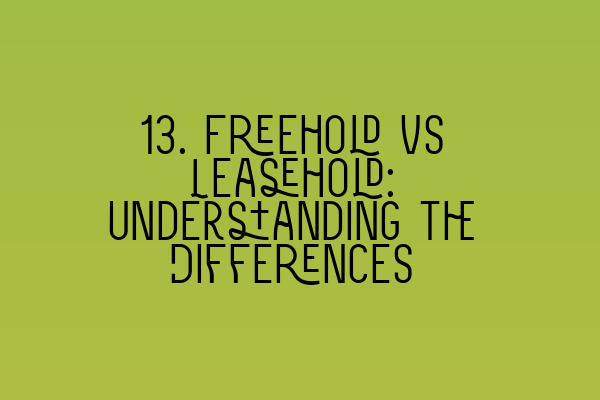Freehold vs Leasehold: Understanding the Differences
When it comes to property ownership, there are two main types to consider: freehold and leasehold. Understanding the differences between these two forms of ownership is crucial, as it can have a significant impact on your rights and responsibilities as a property owner. In this article, we will delve into the key distinctions between freehold and leasehold properties, providing you with the knowledge you need to make informed decisions.
What is Freehold?
A freehold property refers to full ownership of both the property itself and the land on which it stands. When you purchase a freehold property, you become the outright owner and have complete control over the property for an indefinite period. This means you have the right to use, alter, and dispose of the property as you see fit, subject only to applicable laws and regulations.
One of the main advantages of freehold ownership is that you are not bound by any lease terms or restrictions. You have the freedom to make changes to the property without seeking permission from anyone else. Additionally, you will not have to pay any ground rent or service charges typically associated with leasehold properties.
It’s important to note that freehold properties are most commonly houses, although in some cases, you can also find freehold flats or apartments. When considering purchasing a freehold property, it’s crucial to have a clear understanding of any maintenance obligations, as you will be solely responsible for the upkeep of the property.
What is Leasehold?
Unlike freehold, leasehold properties involve a lease agreement between the owner of the property (known as the freeholder) and the leaseholder. In a leasehold arrangement, the leaseholder obtains the right to use and occupy the property for a specified period, subject to the terms and conditions set out in the lease agreement.
The lease period can vary greatly, ranging from a few years to hundreds of years. During the lease term, the leaseholder has to pay an annual ground rent to the freeholder and may also be required to pay service charges to cover the maintenance and repair costs of the common areas or the building itself.
While leasehold properties are most commonly associated with flats or apartments, it’s worth noting that certain houses can also be leasehold. This is especially common in new build developments, where the developer retains ownership of the land and grants individual homeowners a lease.
Key Differences: Freehold vs Leasehold
Now that we have a basic understanding of freehold and leasehold properties, let’s look at some of the key differences between them:
- Ownership: Freehold gives you full ownership of both the property and the land, whereas leasehold only grants you the right to use the property for a specific period.
- Control: Freehold properties offer greater freedom and control over the property, allowing you to make changes without seeking permission. Leasehold properties, on the other hand, may have restrictions on alterations and require permission from the freeholder.
- Obligations: Freehold owners are solely responsible for the maintenance and repair of the property. In leasehold properties, the responsibility for maintenance may be shared between the leaseholder and the freeholder, depending on the terms of the lease.
- Costs: While freehold properties do not typically involve ongoing payments, leasehold properties may require the payment of ground rent and/or service charges. These costs can vary depending on the terms of the lease and the services provided.
- Length of Ownership: Freehold ownership is indefinite, meaning there is no predetermined end date. Leasehold ownership, however, has a specific lease term, which can range from a few years to several decades.
Which One is Right for You?
Choosing between freehold and leasehold ownership depends on various factors, including your long-term plans for the property, your budget, and your tolerance for potential restrictions. Freehold ownership offers greater freedom and control but may require more financial responsibility for maintenance and repairs. Leasehold ownership may be more affordable initially but can come with ongoing costs and restrictions.
Ultimately, it is essential to carefully review the terms of the lease and seek legal advice before making a decision. A solicitor specializing in property law can help you navigate the complexities of the lease and ensure you fully understand your rights and obligations as a leaseholder.
At SQE Property Law & Land Law, we provide expert solicitors who can guide you through the process of buying or selling a property. Whether you are considering a freehold or leasehold property, our team has the knowledge and expertise to assist you every step of the way. Contact us today for a consultation!
